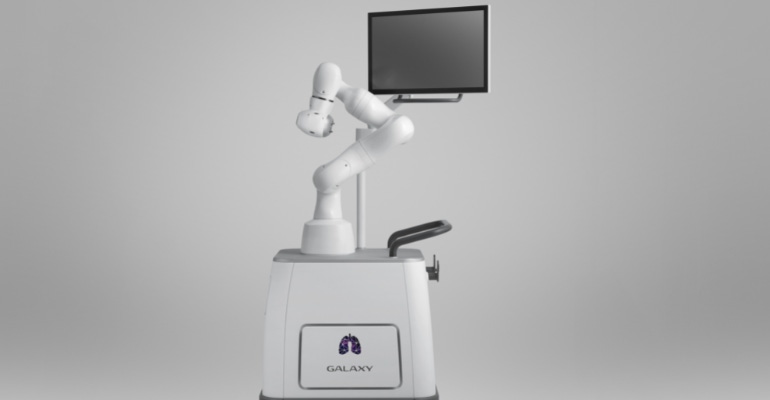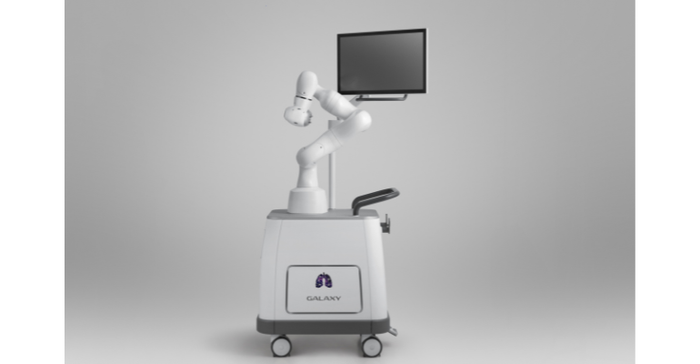New Robotic Bronchoscopy Trial Launches in Australia
The first-in-human trial will evaluate the Galaxy System, an integrated solution for navigated robotic bronchoscopy.
March 16, 2023

A new surgical robotics system has officially entered the scene for robotic bronchoscopy.
Noah Medical unveiled its ongoing trial at Macquarie University Hospital in Sydney, Australia. FRONTIER is a first-in-human trial focused on the safety and feasibility of the Galaxy System, which is designed to improve location accuracy and successful diagnosis of lung nodules using its TiLT+ technology.
The study is enrolling a small cohort of patients with the goal of successfully navigating to and taking biopsies of peripheral lung nodules. The Galaxy System’s navigation capabilities were developed to enable improved diagnosis and quicker time to treatment.
So far, physician feedback has been "highly positive," according to the San Carlos, CA-based company, with praise for Galaxy's TiLT+ technology with integrated tomosynthesis and augmented fluoroscopy, its single-use disposable bronchoscope, and the system’s small, compact footprint, which allows for improved procedural workflow.
“My colleagues and I have been excited to have the opportunity to be the first users of the Galaxy System. The addition of integrated tomosynthesis, with augmented fluoroscopy and Strikepoint, has provided additional information and assurance to us that our biopsy tool is in the lesion,” said Alvin Ing, principal investigator, and a professor at Macquarie University Hospital. “We see strong potential for the Galaxy System to improve the tool-in-lesion rates for interventional pulmonologists around the world and view it as an important advance in the early diagnosis and management of lung cancer.”
Jian Zhang, founder and CEO at Noah Medical, said this is the first study to validate the system's core value propositions within a clinical environment.
Notably, Zhang has a strong track record in the surgical robotics space. He previously worked in engineering at Intuitive Surgical, the pioneer of robotic surgery, and he was the director of system engineering and research at Auris Health, which Johnson & Johnson acquired for $5.7 billion in 2019. He also has experience on the industrial side of robotics, having co-founded Robotphoenix.
FDA clears the Galaxy System for Navigated Robotic Bronchoscopy

Earlier this month, FDA cleared the Galaxy System for navigated robotic bronchoscopy.
Noah Medical said the system and its accessories are intended to provide bronchoscopic visualization of and access to patient airways for diagnostic and therapeutic procedures.
Most potentially cancerous lesions are in the outer third of the lung, which is more difficult for doctors to reach for biopsy, the company noted, and current technologies are limited in the ability to both reach and then precisely target these suspect lesions. The Galaxy System’s advanced imaging technologies provide real-time location updates and are designed to improve tool-in-lesion and diagnostic yield, according to Noah Medical.
“While various technologies to diagnose lung cancer have been utilized over time, the diagnostic yield has remained relatively low,” Zhang said. “The Galaxy System is designed to close this gap in the market, giving clinicians a safe and easy-to-use platform to potentially improve diagnostic yield and produce better clinical outcomes. With this FDA clearance, we are excited to move into the commercial phase of our journey.”
Importantly, the system is designed with a single-use, disposable bronchoscope, which addresses the industry's dirty bronchoscope problem. This is a big deal because, as MD+DI has previously reported, FDA received 867 reports related to infections or device contamination associated with reusable flexible bronchoscopes between July 2015 and January 2021. Reusable bronchoscopes are notoriously difficult to clean, making disposable bronchoscopes an ideal solution.
About the Author(s)
You May Also Like




.png?width=300&auto=webp&quality=80&disable=upscale)